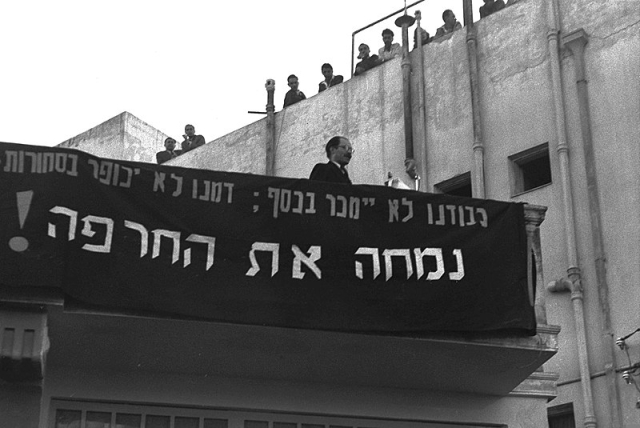On November 3rd, 1952, the Egyptian government submitted a memorandum to the West German Government outlining the basis of Arab protests against German payment of reparations to Israel, an agreement that had been signed two months prior to September 10th.
During Israel’s early years and to some extent till this day, reparations for the Holocaust and the destruction of European Jewry by the Nazis were crucial for the economy. As part of the effort to eliminate Israel, Egypt along with other Arab states tried to prevent the flow of funds into the fledgling Jewish State.
Arab countries saw the reparations as a direct attack on them due to the war they declared on Israel by its mere creation. One fact many do not know is that many of today's Holocaust-denier theories are actually based on information contained in the collective Arab attempt to stop German reparations for the Jewish state.
2/ Via the Conference on Jewish Material Claims Against Germany (Claims Conference), Germany would compensate individual Jews for losses in Jewish livelihood and property resulting from Nazi persecution. @ClaimsCon
— Today in Israel's History (@TodayIsrael) September 11, 2020
The West German Bonn Government of the 1950s, did not cave to Arab pressure. When the Arab League delegation arrived in Berlin to officially protest the reparations agreement, the Germans decisively told them that the agreement is not to target Arab states.
The Germans further pointed out that the agreement has nothing to do with any military agreement or arms deal and that goods from reparations payments may not be given abroad. The Germans made it a point to say that all reparations payments will not be used for any Israeli defensive purposes and only for the development of the Israel infrastructure. In hindsight, it is known today that Israeli infrastructure development contributed to the nation's military advancement, and much of the money was used to build out Israel's defense capabilities.
September 10 – 1952: West Germany & Israel sign Reparations Agreement. The FRG asks the UK to use its dipl. influence to counter Arab protests. Arab states are angered that Israel receives reparations, while Israel refuses to compensate Palestinian refugees. #OTD pic.twitter.com/fbbD59UcYA
— LorenzLuthi (@LorenzLuthi) September 10, 2022
The first two members of the seven-nation Arab League delegation who arrived first in Berlin on October 21st held a press conference at which they criticized West Germany for negotiating directly with Israel rather than through the United Nations Palestine Conciliation Commission.
The Arabs further argued that by not negotiating through the UN, West Germany was undermining international law and ethics, specifically the ones that led to the creation of the Nazi regime in the first place.
Germany announces a reparations agreement with Israel ahead of the 50th anniversary of the massacre of Israeli athletes at the Munich Olympics. pic.twitter.com/7MC8bbZwO4
— Jacob Kornbluh (@jacobkornbluh) August 31, 2022
The Arab League went as far as threatening to cut relations with West Germany and with that would come the halt of all products including oil. Nevertheless, the Germans showed no signs of distress or fear and continued with the reparations. German influence on Israeli infrastructure is felt to this day and can be seen all over, from German Seamless trains used by Israeli railways to the abundance of German vehicles on the roads.
Incidentally, the future Prime Minister of Israel and the one who would make peace with Egypt, Menachem Begin was a fierce opponent to even negotiating with the German government, let alone accepting 'blood money' which he saw as a tacit approval for the atrocities committed. He believed that allowing the German government to appease their guilt with money was in fact selling out the memories of those who perished under the Nazis and cheapening their worth. His belief that no human life can be paid for with cash did not resonate with the Israeli population.


